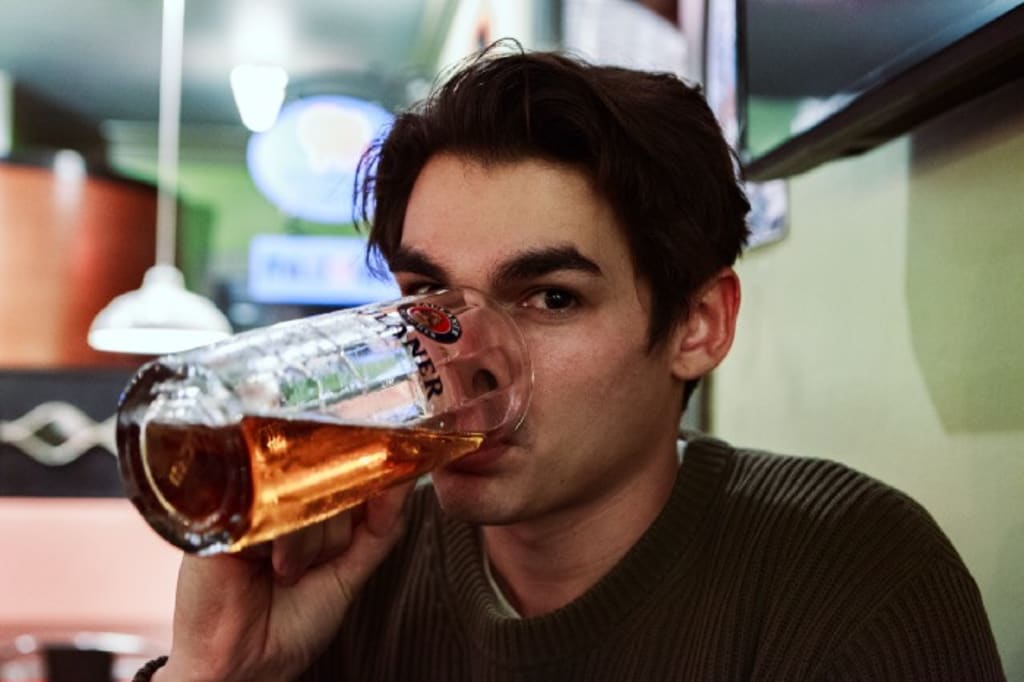Did You Know That In Germany You Can Buy And Drink Beer From The Age Of Sixteen?
Alcohol is without doubt harmful and every alcoholic is one too many. But this article is not an argument for or against alcohol. I describe my personal experiences with what it is like to be allowed to drink beer from the age of sixteen.

I am now forty seven years old and I drink alcohol perhaps twice a month. Sometimes I do not drink at all for weeks. But I bought my first beer when I was sixteen and drank a lot in my youth.
Germany is famous worldwide for its beer culture. On our motorways there is no speed limit in many places and tobacco advertising is still allowed, at least in certain places.
Much of this can be found problematic. The public discussion in Germany is becoming increasingly sensitive to the problem, and a general speed limit should soon be introduced. Government campaigns against smoking and constantly rising cigarette prices are contributing to a steady decrease in the number of smokers.
Only the age limit for alcohol consumption will probably remain unchanged in the future. Only in February of this year, the federal government again declared that it sees no reason to raise the minimum age for alcohol consumption.
So in Germany we are allowed to continue consuming beer from the age of sixteen and hard alcohol from the age of eighteen.
The reason for this is, among other things, that in Germany the emphasis is more on the personal responsibility of the citizens than on bans and government regulations. I explicitly do not judge this attitude here. I am not a health expert and do not intend to lecture anyone.
I can only describe what effects the German practice had on me
My first contact with beer
To tell you the truth, I didn’t drink my first beer when I was sixteen, but when I was fifteen. A sixteen year old friend of mine had got me the beer and then we drank it together in a park. It must be said that drinking in public is also legal in Germany. You can open a beer in the middle of the pedestrian zone and nobody will criticize you for it.
I didn’t like the beer very much, because it was bitter. That’s why I only had two bottles. It didn’t make me drunk, but I felt stimulated. At that time I was very sporty, so the alcohol probably didn’t affect my body too much.
When I turned sixteen, I bought my own beer. At first the occasions were rare. Every now and then we would meet up with a few friends and drink beer when we rented a video film.
But over time, alcohol became the norm. Whenever we met, my friends and I usually drank alcohol as well. We definitely didn’t drink just because we liked it. Our goal was to get drunk. With alcohol we felt more courageous, more mature and had less inhibitions.
At parties it helped to attract girls and to dare to get on the dance floor.
But alcohol remained a social matter for us. As far as I know, none of us drank alone.
That only changed for me when I moved into my first own apartment with a friend at the age of nineteen. We drank there every day. It was normal for us.
But we didn’t crash. The alcohol, at least for me, never determined our everyday life. I worked, studied and did sports. My young body forgave me my sins generously.
At my present age I could no longer afford to consume such quantities. It would probably put me in my grave quickly.
How my environment reacted
My family, to make a long story short, did not react at all. My father made it clear that I was a responsible person and that he assumed that I would not overdo it with alcohol. Nevertheless, he said he would keep an eye on me and intervene if he felt that things were getting out of hand.
My mother and all my uncles and aunts felt the same way. At family celebrations, I toasted with the adults as a matter of course and was accepted as fully-fledged. In Germany alcohol apparently has a kind of initiation function. Perhaps this is also related to the fact that young people who do not study usually start their vocational training at the age of sixteen.
Those who are old enough to work are also old enough to drink, the Germans apparently think.
Alcoholism was therefore also long regarded as a weakness of character rather than a disease. This has of course changed fundamentally over the past twenty years. Alcohol is also viewed much more critically in families today than when I was young.
Alcohol after youth
I still like drinking, but very rarely. When I drink alcohol, it’s for social occasions. I never drink at home. A glass of wine or beer in the evening dulls my performance the next day too much for me to accept.
I drank a lot of alcohol between the ages of sixteen and twenty-four. Since I was twenty-five years old, I have greatly reduced my consumption.
I think that my studies and the jobs I had to do to earn the money for my studies were responsible for this. I had to perform well and could no longer afford alcohol-induced weaknesses.
So in my case the approach of personal responsibility worked well. Despite the constant availability of alcohol, I didn’t become an alcoholic and I don’t miss anything today when there is no alcohol for a few weeks.
By the way, I have never drunk as little as during the Corona Lockdown. There were no restaurant visits and no birthday parties, so there was no reason to consume alcohol.
Would I have drunk less as a teenager if the laws had been different?
I don’t think that would have been the case. I could always observe that it was those whose parents were the strictest when it came to alcohol that overdid it the most.
I probably would have been much more tempted by a ban than deterred. I always had a rather rebellious character, and if I had seen the chance to provoke my parents or society by drinking alcohol, I would have made ample use of it.
The relaxed attitude of the adults in my environment has personally made it easy for me to gather my own experiences with alcohol and thus to form an experience-based opinion.
When I look at America, where alcohol is generally only allowed from the age of twenty-one, I don’t get the impression that young people there are better at dealing with alcohol than in Germany. Nevertheless, they get the hang of it and, precisely because of the ban and the social ostracism, they do their utmost to drink as much as possible as soon as they have the opportunity.
So do I find the German Model better? I cannot judge that. It worked for me. I was able to try it out, gather my experiences and then later mark this phase off as a youthful phase. For people who are susceptible to addictions, it may look different.
What do you think? Is Germany crazy to allow its youth to drink? Or is it better to work with education instead of bans?
I’m curious about your opinions.
About the Creator
René Junge
Thriller-author from Hamburg, Germany. Sold over 200.000 E-Books. get informed about new articles: http://bit.ly/ReneJunge






Comments
There are no comments for this story
Be the first to respond and start the conversation.